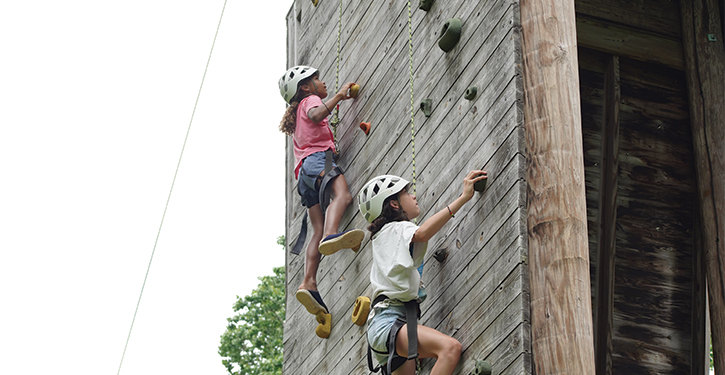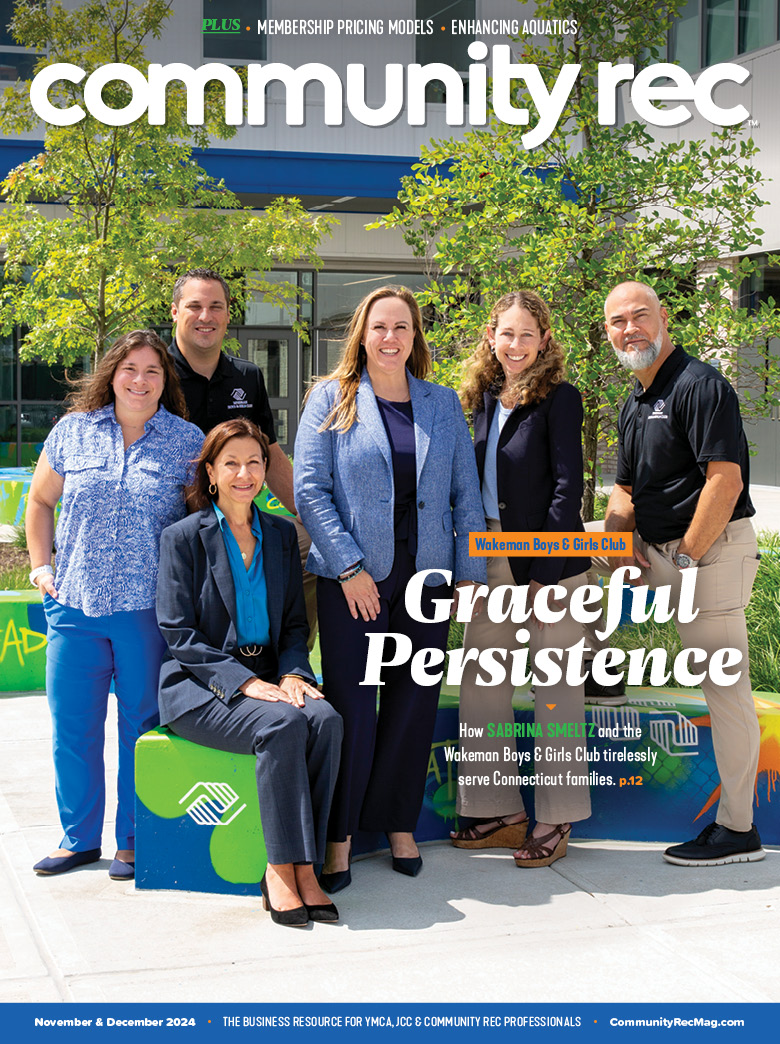Youth recreation leaders share their most successful afterschool activities for children. Above: YMCA Camp Tockwogh has several attractions for youth including rock wall climbing.
TV host and author Fred Rogers once said, “Play is often talked about as if it were a relief from serious learning. But for children, play is serious learning. Play is really the work of childhood.”
This sentiment holds true at Motio Recreation in Randolph, Vermont, where the afterschool climbing club teaches youth and teens how to rock climb, make climbing routes, tie knots, build trust in their peers and in themselves, and so much more.
“This has been successful because there always seems to be a need for afterschool activities,” said Lindsay Haupt, the founder of Motio Recreation. “It’s something new to many of our community members. It provides movement, but it’s a different form of athletics than many sports which makes it fun and exciting.”
The facility has several attractions for youth including an indoor field, batting cage, rock wall, springboard floor, air track, golf simulators, low-impact circuit, workout space and a multi-purpose room.
While the climbing club is Motio Recreation’s only afterschool program, the many offerings provide an ample number of programming ideas for any rec center.
“We have offered summer camps, clubs, classes, in-service camps, kids’ nights out and hybrid learning camps during COVID-19,” said Haupt. “Most of these adapted out of the needs of the local community. We take advantage of our unique indoor and outdoor spaces to provide variety and keep things interesting.”
However, the fun doesn’t stop there. The YMCA of the Foothills’ Progressive Individual Leadership of Teens (P.I.L.O.T’S) program aims to build spirit as teens discover a deeper meaning for living built on compassion, leadership and fun.
Annie Azizian, the branch manager at the Y, said groups in the initiative select and work on service projects during meetings as well as once-a-month weekend projects.
“P.I.L.O.T’S believes in community involvement for our middle and high school students as they have the opportunity to give back,” said Azizian. “There is one fun group activity each semester and a weekend trip to celebrate a successful program each spring.”
Outside of P.I.L.O.T’S, the Y also provides elementary school-aged children with various afterschool activities like gymnastics, dance, basketball, volleyball, soccer and swim lessons.
“Our programs encourage to promote healthy kids, families and communities by prioritizing family involvement, wholesome competition and the value of participation — not just winning,” said Azizian. “Kids and teens learn team-building skills, a sense of fair play and mutual respect for others while also growing as individuals and developing a positive self-image.”
For teens in grades 9-12, the Y also runs the national Youth and Government education program. This initiative enables young adults to prepare for post-high school opportunities via moral and political leadership through training in the theory and practice of developing public policy. While only available for members, Azizian said they use Daxko software systems to streamline the membership process for everyone.
YMCA Camp Tockwogh also has a plethora of exciting attractions for youth thanks to camp leaders striving to take advantage of their surroundings. Located on the Chesapeake Bay in Worton, Maryland, the camp has a full range of activities with two waterfront beaches and on-land programs.
“Tockwogh is a place to be unplugged from modern technology and focus on the camp atmosphere,” said Julia Heller, the camp director. “Our camp has many offerings not commonly found at afterschool programs, but kids are very interested in activities where they can learn a new skill. They love our archery, slingshots and ropes courses.”
To ensure the camp is successful, Heller said they hire staff who love working with youth as children have more fun when counselors are passionate about what they are instructing.
Haupt said Motio Recreation focuses on hiring staff who have a real interest in children and their development. They also welcome volunteers to come help with pony rides, making smoothies, teaching survival skills and first aid, and more.
“We manage to run programs effectively by keeping our child-to-staff ratio around 7-to-1,” said Haupt. “Activities are not just babysitting. They are about directly engaging and interacting with kids while teaching them many life skills.”
Having a firm schedule in place is also critical to the success of afterschool programming. Haupt said kids do well with routine and when they know what to expect. While there needs to be room for change and adaptation, having a general plan in place is helpful for everyone.
“This also holds true for behaviors,” said Haupt. “If you set clear rules and guidelines and follow them consistently, kids will know the expectations and often follow them — especially if following the rules leads to more fun games and opportunities.”
But if community rec centers simply offer a variety of fun options for children and an adaptable space, Haupt said organizations will enjoy a successful afterschool program.
“Have enough space for lots of movements as kids have lots of energy,” said Haupt. “Also, work with the local community to add enrichment opportunities and further variety. I honestly think kids can be interested in almost anything if the adults can just get involved and show them how it’s fun.”










